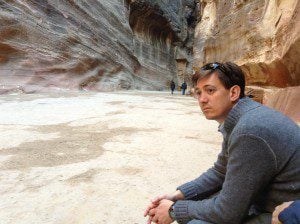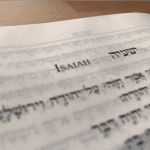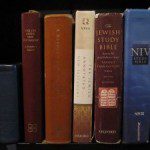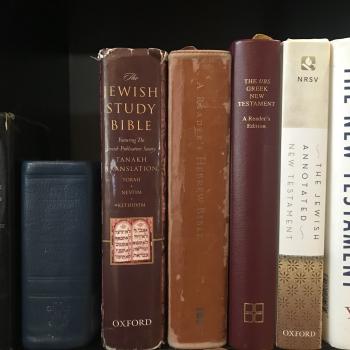
This is a long post, with four sections, but I ask you to read it because I think it’s important.
I first explain the nature of my concern, the two emblematic issues involved, and conclude by inviting you to do something.
Intro/Why I’m concerned
The 2019 Seminary manual for Old Testament is now available. I skimmed through some early bits, and I’m concerned for the future faith of our LDS youth.
My concern can be summed up with this: we treat ancient scripture very differently than we treat Church history, but ancient scripture needs it just as much, if not more.
In the same year that Seminary students are learning about Joseph Smith’s seerstone, that ground-breaking history Saints is published, that we have the Gospel Topics essays, that faithful professional historians like Kate Holbrook and Matt Grow are featured in face-to-face videos for youth, the Joseph Smith Papers, and so on… the way we teach ancient scripture to youth remains so simplistic as to be misleading and even factually incorrect at times.
Elder Ballard’s words about necessary expertise (he specifies Biblical studies and ancient history) have not yet affected the way our manuals are written for teaching and understanding ancient scripture. When they do cite scholarship, it tends to be old and/ or unreliable. To paraphrase Elder Ballard elsewhere, our traditional approach and “curriculum, though well-meaning, does not prepare students for today—a day when students have instant access to virtually everything about the Bible from every possible point of view.” This well-meaning overly simplified approach paves the way for the next generation’s faith crisis (please read that if you haven’t.)
I can be quite pedantic at times, I admit, but I want to emphasize that my concern here is pastoral, not academic. President Faust quoted President Hugh B. Brown that
God desires that we learn and continue to learn, but this involves some unlearning. As Uncle Zeke said: ‘It ain’t my ignorance that done me up but what I know’d that wasn’t so.’
For whatever reason, a number of LDS internalize what manuals say as divinely revealed truth, the Way Things Really Are. If not correct, such statements wouldn’t be in manuals approved by the First Presidency, goes the reasoning. (I have seen some volunteer seminary teachers essentially hold manuals to be inerrant.) So what happens when those things LDS have to unlearn are things that were explicitly presented to them in correlated and approved manuals? Are we contributing to future faith crises?
The more simplistic the claim and the tighter it is linked with the truth of scripture, the easier we make it to reject scripture and faith when that claim turns out to be more complex, or even wrong.
Please do not misunderstand me; Seminary should not be a graduate seminar in complex scriptural issues, but it also shouldn’t simplify to the point of misleading or incorrectness. It needs to be accessible to the high-school student as well as the new-convert Mandarin-speaking teacher. But there are ways to acknowledge and prepare people for complexity without presenting it. (I offer one example below.) At minimum, we need to avoid creating the expectation that there IS no complexity, that this simplicity is all there is to know.
What’s potentially damaging or challenging to faith depends entirely, I think, on one’s expectations…. Any kind of experience can be shattering to faith if the expectation is such that one is not prepared for the experience…. the problem is the incongruity between the expectation and the reality.
So wrote LDS historian Davis Bitton.
What expectations does the manual create? Do people expect further information, expansion, or nuance later? “Milk before meat” is a true principle (one I think we commonly misapply), but we do have to let people know the meat exists and actually provide it somewhere or point people to it! Manuals must create proper expectations, or they put faith at serious risk. Church History is now being presented in its fullness and complexity… but not ancient scripture.
Two Examples from the Manual
I could certainly pull out more examples, but these were in the introduction and Genesis is near to my heart.
- Who wrote Genesis and the Book of Moses?
The manual states bluntly that Moses wrote Genesis through Deuteronomy. This is certainly traditional, but it’s also much more complicated than that. As stated, the manual doesn’t even reflect the nuance of the LDS Bible Dictionary, which portrays Genesis as a Mosaic document based on pre-existing documents and with post-Mosaic editing.
The Seminary manual says “Who wrote the first book in the Bible? Turn to Genesis 1 to find out.”
Genesis 1 doesn’t say anything about authorship, unless you’re looking at the heading, which is not actually part of scripture. What does Genesis- Deuteronomy actually say about who wrote it? Here’s a link to a Jewish perspective looking at that question in depth.
Well, what about the Book of Mormon and the Book of Moses? Don’t they settle the question of the authorship of Genesis-Deuteronomy? Again, these are complicated, but the manual makes no room for acknowledging “complicated” and that, again, is the real problem.
The Book of Mormon reflects Nephi’s tradition of Mosaic authorship, but there’s no evidence of God revealing this fact to Nephi as much as Nephi assuming it. Scripture tends to reflect the cultural assumptions of the time, but even revelation cannot be assumed to be ultimately correct in a historical/scientific/factual/doctrinal sense. That’s both a genre issue (which our manuals tend to ignore) and a theological one. These are topics I’ve written about extensively in places like the FAIRMormon Conference, the Maxwell Institute (paper not publicly available yet), BYU’s Sperry Symposium, and UVU’s Mormon Studies Conference. As for Moses, in October I’m speaking at the Joseph Smith Papers conference at the Church History Library on the relationship between Genesis, Moses, and Abraham, and what it tells us about the nature of revelation.
I’m uncomfortable doing so, but if it carries any weight, let me emphasize that I’m an active, believing, temple-recommend carrying Mormon, that the relatedness of scripture, science, and interpretation is my area of professional expertise, and that these arguments are made in (at least quasi-) academic, vetted, faithful venues like the Joseph Smith Papers.
Since I try not to criticize unless I can contribute, if I wrote the manual, it would read something like this.
While tradition attributes the books of Genesis through Deuteronomy to Moses, the Biblical text itself does not actually say that Moses wrote it, and different kinds of clues in the text suggest that different authors and editors at different times contributed to these books as we know them today. For example, unlike Nephi’s repetitive first-person “I Nephi,” the Bible consistently refers to Moses in the third-person, “He, Moses,” even describing his death in Deuteronomy 34! The Church is not committed either to strictly Mosaic authorship nor to other views. As the First Presidency said in 1910, it is not ultimately authorship that matters, but whether the doctrine is correct.
2. Revelation as Dictation
Moses 1:40 reads “And now, Moses, my son, I will speak unto thee concerning this earth upon which thou standest; and thou shalt write the things which I shall speak.”
The manual takes this passage as proof of Mosaic authorship of both Moses and Genesis and then uses it as a paradigm for revelation and scripture.
I find that problematic from several different angles. I can’t address them all here nor lay out my own view of the relationship between Moses 1 and 2-4, which parallel Genesis 1-3. (Again, I’m addressing this partially at the JSP Conference in October and also in my book.) First, the manual assumes the absolute historical/documentary nature of the Book of Moses. That’s not in keeping with what we know of the JST, nor is it actually argued, just assumed. That’s a genre issue.
Second, it implies that the entirety of the Old Testament (and revelation in general) is God dictating to prophets! Prophets as mere scribes, mechanically and passively taking down the words that God dictates! I know some LDS hold to this idea, but it runs against everything we know about scripture ancient and modern. Let’s stick with modern for a moment.
Very orthodox Mormon scholars in orthodox venues looking closely at D&C have argued strongly for a very different view of revelation. For example, The Ensign has carried the statement about D&C from Robert Woodford that
Elder Orson Pratt confirmed President Woodruff’s statement and added: “Joseph … received the ideas from God, but clothed those ideas with such words as came to his mind”
That’s not divine dictation.
Steven Harper, former BYU professor who then became a historian for the Church, an editor for the Joseph Smith Papers, and new Editor in Chief of BYU Studies, writes of the “process of revelation” in a BYU publication, concluding
Joseph knew better than anyone else that the words he dictated were both human and divine, the voice of God clothed in the words of his own limited, early American English vocabulary. He regarded himself as a revelator whose understanding accumulated over time. Joseph recognized as a result of the revelatory process that the texts of his revelations were not set in stone. Rather, he felt responsible to revise and redact them to reflect his latest understanding.
If Joseph merely received God’s word and wrote it down (Harper details how William McClellin thought this), then he should have known not to change it. But that wasn’t Joseph’s understanding of revelation!
Similarly, according to the pioneering JST scholar Robert Matthews, quoted in The Ensign, (and remember the manual presents the Book of Moses as the JST)
[the JST] was not a simple, mechanical recording of divine dictum, but rather a study-and-thought process accompanied and prompted by revelation from the Lord. That it was a revelatory process is evident from statements by the Prophet and others who were personally acquainted with the work.
Sometimes, like with D&C, Joseph made revisions or translated the same passage differently. Sometimes he preached according to the KJV, not the JST. And usually, the Book of Mormon matches the KJV, not the JST. These are difficult things to account for, if you assume that revelation is dictated by God.
Grant Underwood, another BYU professor, gave a fantastic BYUH devotional about “Relishing the Revisions: Joseph Smith and the Revelatory Process” and also has a BYU Studies article called “Revelation, Text, and Revision: Insight from the Book of Commandments and Revelations.” He also presents strong evidence against a dictation model of revelation.
The preeminent scholar of the text of the D&C, Robert Woodford, wrote several articles in The Ensign which militate against divine dictation, like this one and that already quoted above.
Joseph Smith did not receive all these revelations as word-for-word dictations from the Lord (although he may have received some this way). Rather, he received inspiration and wrote the revelations using his own words, often couched in Victorian English.
Revelation can work more than one way, of course, but presenting a “dictation” model as THE WAY we got the Old Testament overreaches, dangerously in my view, by presenting it as THE PRIMARY WAY prophets get revelation. This is too simple and too rigid, and also can’t account for modern or ancient scripture. Why are we teaching Seminary this way? Why not teach explicitly that revelation is a process, that scripture is (usually) God’s word in human words? (A simpler and fantastic version of that book is this one.)
This idea of revelation as process, as divine/human collaboration, makes much more sense of the difficulties of the Old Testament that are much much harder to square with faith if the whole thing was just dictated by God.
What expectations does the manual create for students and teachers by presenting divine dictation as the primary mode of Old Testament revelation and, by extension, modern revelation? Are those expectations accurate and well-founded? Are they healthy for the long-term sustainable spiritual health of our youth and soon-to-be-missionaries?
What You and I Can Do
As much as I think we misread the story of Uzzah, I am not comfortable with what’s typically called “steadying the ark” or “counseling the brethren,” but then, I don’t think that’s what I’m doing here. These manuals are not revealed by God nor written by Apostles under divine inspiration. These manuals invite feedback and even correction for mistakes. Moreover, President Nelson recently taught that “good inspiration is based upon good information” and I hope I am providing some of that.
I know that there is currently a group writing a manual to replace the Old Testament Institute manual; the very problematic 1980 manual remains current. (That manual forces a dichotomy between accepting evolution OR the Gospel on p.34, and contains a 2000-word (!) extract from a Seventh-day Adventist pamphlet against evolution, written at a creationist research institution, p.34-36.)
However, if my sources are reliable, the new writing committee, while no doubt good people and teachers, has no expertise in Bible, ancient Near East, Greek/Hebrew/Aramaic, etc. The Bible is an ancient book written for ancient people, and when we try to read it as modern Mormonism, we misunderstand it, to our detriment. Are we looking at a repeat of the Seminary manual’s simplistic tradition, but now aimed at college students around the world?
The manual introduction says
Comments and corrections are appreciated. Please send them, including errors, to…. [email protected] [Also copy them to [email protected]] Please list your complete name, address, ward, and stake. Be sure to give the title of the manual when you offer your comments.
If any of this concerns you as it does me, the proper way to express those concerns is through the two email addresses above. Please do so in a constructive way, either in detail or generally, without rancor, but expressing the experiences and needs of your family in Seminary, Institute, and Gospel Doctrine. I hope you would express a concern and hope that we bring Ancient Scripture up to the level of Church History, that we provide LDS around the world with the equivalent of Revelations in Context for the Bible. We need some collaboration or even oversight between the manual writers and reliable LDS scholars of Bible, history, ancient near east, etc. In short, we need Ancient Scripture to catch up to Church History, and this for the faith of our youth and adults.
The Bible, after all, is our primary point of contact with Jews, Christians and Muslims, and the foundational scripture of our beliefs. All our modern revelations presume a knowledge and base of the Bible. To quote Elder Ballard again, from a talk called “The Miracle of the Holy Bible,”
The more we read and study the Bible and its teachings, the more clearly we see the doctrinal underpinnings of the restored gospel of Jesus Christ. We tend to love the scriptures that we spend time with. We may need to balance our study in order to love and understand all scripture. You young people especially, do not discount or devalue the Holy Bible. It is the sacred, holy record of the Lord’s life. The Bible contains hundreds of pages more than all of our other scripture combined. It is the bedrock of all Christianity.
Sending out our missionaries with a simplistic view of the Bible’s inspiration and content does not prepare them fully for their work, and is sometimes a distinct disadvantage. Shortchanging the Bible and ancient scripture for sake of tradition undermines our missionary program.
So write in, if you feel so moved. But also, study on your own, and contribute to making your ward’s various classes better. Act within your sphere of influence. Balance your study to include the Bible in context. Good teachers and knowledgeable parents and friends can mitigate less-than-ideal manuals in adapting to local needs, and we are each commanded to study and learn out of the best books, as well as teach each other. In doing so, we fulfill our individual call to discipleship.












